Illinois Baptist
Say the right thing
The church needs compassion for fertility issues



The church needs compassion for fertility issues


The groovy generation returns—to church?

The groovy generation returns—to church? P. 7


SANCTITY OF LIFE
Urging ‘Keep the baby’
Requires ministering to the family
P. 11
NATE ADAMS
It’s about time
Here’s why I wear two watches
P. 2
NEW YEAR COMMITMENT

Bible reading plans
P. 13 JANUARY
8 ways to stay on track
P. 5
EVANGELISM
One grand month!
Start now for April’s baptisms
P. 16
P. 9




EXPLORE
800 churches offer gospel guidance for life’s biggest questions
More than 800 churches in Chicagoland are committed to help people in their communities answer pressing questions about life and God. In January and February, congregations across northern Illinois will “Explore God” through a series of sermons and small group meetings designed to start gospel-focused conversations.


Scott Nichols is part of the steering committee for the interdenominational, region-wide

As Illinois turned 200 in 2018, IBSA is seeking to engage at least 200 churches in each of these challenges. Is your church one of them?
Read more about these challenges and register your church for one or more at IBSA.org/Pioneering, or contact IBSA’s John Carruthers at (217) 391-3110 or JohnCarruthers@IBSA.org.
So much happened in the 90 years between the founding of the state and the founding of the state association. The Illinois Baptist State Association was organized in 1907 at First Baptist Church in Pinckneyville. Today, there are almost 1,000 IBSA churches and church plants.

Giving
Budget Goal: $6,057,693
Received to date in 2017: $5,671,533
2018 Goal: $6.3 Million
Editor - Eric Reed
Managing Editor - Meredith Flynn
Graphic Designer - Kris Kell
Contributing Editor - Lisa Misner
Multimedia Journalist - Andrew Woodrow
Administrative Assistant - Leah Honnen
The general telephone number for IBSA is (217) 786-2600. For questions about subscriptions, articles, or upcoming events, contact the Illinois Baptist at (217) 391-3119 or IllinoisBaptist@IBSA.org

The Illinois Baptist is seeking news from IBSA churches. E-mail us at IllinoisBaptist@IBSA.org to tell us about special events and new ministry staff.


POSTMASTER: The Illinois Baptist is owned and published every three weeks by the Illinois Baptist State Association, 3085 Stevenson Drive, Springfield, Illinois 62703-4440. Subscriptions are free to Illinois Baptists. Subscribe online at IBSA.org.
 NATE ADAMS
NATE ADAMS

This past year, my sons convinced my wife that I needed a new watch. Frankly, that idea hadn’t occurred to me, because I already have a nice watch, one that has worked well for over 20 years. It’s also meaningful to me because it was a parting gift from friends at one of my previous employers.
In fact, to be honest, I really like my old watch. It’s wound by pendulum action, so it doesn’t need a battery. It has an easy-to-read face, allowing me to glance at it quickly during meetings, or sermons, which most people seem to appreciate. And it has the date right on it. What else would you want from a watch?
What else indeed! My new Apple watch does so much more than tell me the time and date. It reports how many calories I’ve burned that day, how many minutes I’ve exercised, even how many times I’ve stood up. It precisely describes the current weather conditions, and forecasts them for the future, wherever I am. It knows the time the sun will rise and set each day, and all about the latest news events. It displays my favorite photos, and with the press of a button it makes available dozens of other apps connected to my phone or computer.
When I set exercise goals or appointments or reminders, my watch vibrates or beeps and tells me what to do. Sometimes while I am sitting in a meeting it tells me I’ve been sitting too long and should stand up. So I do. When people ask me why, I now just say, “Because I work for my watch.”
My new watch has also presented me with a challenge, however. After replacing my pendulum watch with my fancy new watch for a few days, I discovered that my old watch had stopped, and I couldn’t get it started again. The jeweler who repaired it told me that he couldn’t promise it would keep running, if I kept letting it wind down.
Some people would probably solve that problem by putting the old watch in a drawer and letting it become a relic, a memento of times past. But I’m not ready for my old watch to stop serving me, or reminding me of the people who gave it to me. So now, not every day, but every couple of days or in the evenings, I wear two watches, one on my left wrist and one on my right. It’s become kind of a conversation starter.
Since beginning that routine, I have started to ponder how much my dual watch situation represents an important reality in today’s churches. In practically every church, there is an older generation of leaders who have served well, and who can continue to serve well. And often, though not always, there is also a new generation of leaders with the same core beliefs and dedication to the church, but with new tastes in music, new needs and preferences, new skills in technology, and new ideas about reaching their generation with the gospel.
Wise pastors and mature church leaders learn to value both generations, and all they have to offer today’s churches. They don’t scorn new ideas and methods simply because the old ones still work just fine. But neither do they discard the old ways simply because some new style or preference comes along.

Sadly, that’s not always the case. It seems more churches are unwilling to learn the new than are discarding or devaluing the old. But a healthy church with a bright future will learn to value and utilize both generations, side by side, as I have my two watches.

Nate Adams is executive director of the Illinois Baptist State Association. Respond at IllinoisBaptist@IBSA.org.

These gifts are teaching me to appreciate the past and the present.
FROM


Continued from page 1
emphasis. His Carol Stream church, Crossroads, has offered Explore God (XG) small groups after Christmas and Easter the last two years. Each time, Nichols told the Illinois Baptist, people have come to know Christ and have been baptized.
“The power of XG is aligning churches in pursuit of the Great Commission, the fundamental mission our faith (and the Lord) calls us to pursue,” Nichols said. “Our people are excited by this campaign.” So far at Crossroads, 52 people have signed up and been trained to lead small groups focused on seven big questions:
• Does life have a purpose?
• Is there a God?
• Why does God allow pain and suffering?
• Is Christianity too narrow?
• Is Jesus really God?
• Is the Bible reliable?
• Can I know God personally?
Nichols will also preach a sermon series on the questions in January and February. Crossroads was the first in their region to adopt XG and has led the charge for more churches to join. Their goal is 1,000 congregations and 10,000
The Southern Baptist Convention’s oldest seminary released a report Dec. 12 on its history with slavery and racism. Called an “honest lament” by President R. Albert Mohler, the report written by current and former faculty details the institution’s founding by four slave owners, and its one-time support for school segregation and other racially-driven policies.
“We have been guilty of a sinful absence of historical curiosity,” Mohler wrote in a letter released with the report. “We knew, and we could not fail to know, that slavery and deep racism were in the story.”
Mohler also underscored the seminary’s commitment to mirror the diversity of God’s Kingdom. “We cannot go back to the 19th century and change the past, but we can make certain that, in the 21st century, Southern Seminary looks like the people Christ is calling to himself through the preaching of the gospel.”
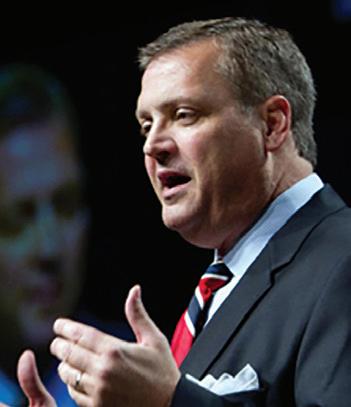
small groups participating in the emphasis this month and next.
“Our prayer is that hundreds are saved and baptized,” Nichols said. “We’re calling our people to risk inviting friends and co-workers into an open-handed gospel conversation for the purpose of sharing Christ in a safe, low-pressure environment.”

To encourage other churches as they participate in Explore God, Crossroads created a video of testimonies from past group participants and church staff, including small groups pastor Nate Nupanga. “What you will find is that many people that might not set foot in your church building otherwise are going to be open to coming to be a part of this group,” Nupanga said. “And that cre-
CHANGED
know Christ through an Explore God small group at Crossroads Community Church in Carol Stream. He and his wife, Katie, were baptized in November. This month and next, churches across Chicagoland will help people answer life’s biggest questions through sermons and small groups designed to start gospel conversations.
ates a great way to connect with people that you otherwise would not be reaching.”
Across Chicagoland, hundreds of churches will do the same, mobilizing their members to invite people around them into gospel conversations around those seven major questions. Phil Miglioratti, IBSA’s recently retired prayer ministries consultant, is co-chairman for the regional initiative.
“The DNA of Explore God Chicago is the heart of our Great Commission SBC churches,” Miglioratti said. “My hope is that by participating they will be reinvigorated with a passion for sharing Christ through gospel conversations.”
For more information about Explore God Chicago or to view evangelism and small group resources, go to ExploreGodChicago. com.

– Meredith Flynn
Protecting the vulnerable was the mission of a December gathering at Wheaton College on evangelical response to sexual abuse and misconduct. The summit featured short talks by speakers including Beth Moore and Ed Stetzer, executive director of Wheaton’s Billy Graham Center.
Closing out the one-day summit, bestselling author Max Lucado revealed he was a victim of childhood sexual abuse by a community leader. The Texas pastor also expressed personal conviction he felt at the Wheaton gathering.

“I’d also like to add my name to the list of those who have sensed today some desire for increased personal repentance,” Lucado said. “In listening, I thought, ‘I had a conversation with her, I could have done better.’ Or remembering the locker room banter from my football days many, many years ago. And just condescending attitudes that I as a senior pastor have employed. So I seek the Lord’s forgiveness.”
– Baptist Press, Christianity Today




Majority of churchgoers still abstain
Nashville, Tenn. | Most churchgoers say the Bible teaches against drunkenness. But that doesn’t stop about 4 in 10 from taking a drink now and then, according to a study released in November.
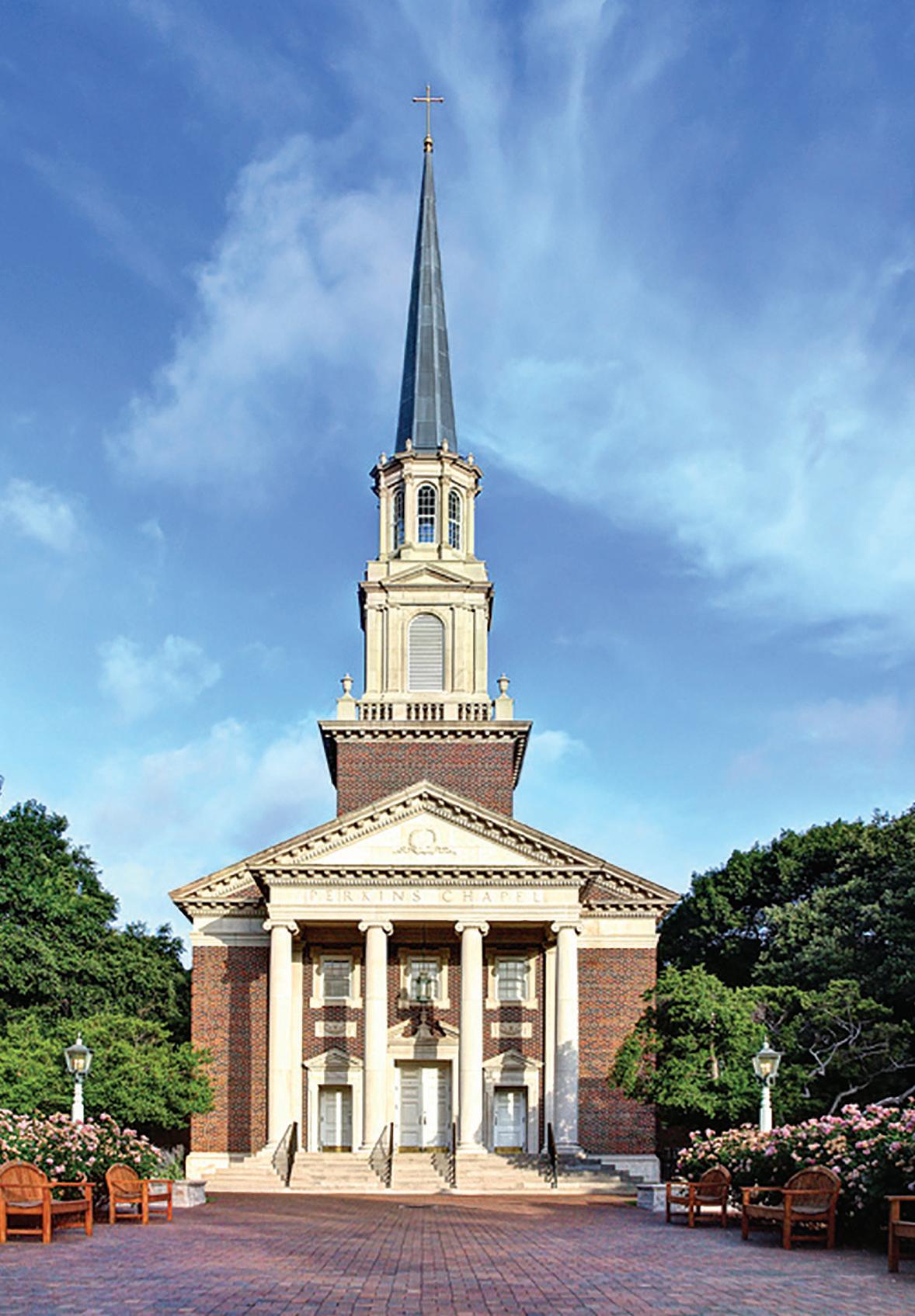
While 41% of Protestant churchgoers say they consume alcohol, 59% say they do not. That’s a slight shift from 10 years ago, according to the current LifeWay Research survey and one conducted in 2007, which found 39% of Protestant churchgoers said yes they consumed alcohol while 61% said no.

Gallup surveys during the last 75 years have typically shown that two-thirds of all American adults have occasion to drink alcoholic beverages, including 63% in 2018.
Louisville, Ky. | In 2014, in a desperate attempt to fix its budget deficit, Flint, Mich., switched its water supply from the Detroit River to an alternative source. Soon after the switch, it was discovered that the new water source was contaminated with toxins—toxins that had been pumped into the water systems of every household in Flint.
“As a result, everyone who drank from this water source received the poison from the water,” said Adron Robinson, senior pastor of Hillcrest Baptist Church in Country Club Hills, to an auditorium filled with students and faculty at Southern Baptist Theological Seminary in Louisville.
“As you matriculate through these hallowed halls, leave this place and join to the kingdom of God and the local ministry of the church, you need to know that you will be a conduit for many…It’s imperative that you make yourself a pure conduit,” Robinson preached at an Oct. 23 chapel service. “It’s imperative that you pass on the pure gospel to them and not allow your life to be contaminated by the toxins of this world.”
Preaching from 2 Timothy 2:20-3:9, Robinson echoed to students the apostle Paul’s plea that in order to fulfill his ministry, Timothy needed to pursue purity both in his proclamation and in his practice.
“While alcohol consumption continues to be seen as mainstream in the United States, churchgoers’ attitudes about drinking haven’t changed much in the past decade,” said Scott McConnell, executive director of LifeWay Research.
Nearly 9 in 10 churchgoers (87%) agree Scripture says people should never get drunk. That’s up from 82% in 2007.
But when it comes to total abstinence, fewer than a quarter of Protestant churchgoers believe Scripture indicates people should never drink alcohol. A majority—71%—disagree.
When Christians drink socially, many churchgoers believe they could cause other believers to stumble or be confused: 60% agree and 32% disagree. Researchers also found slightly more than half of churchgoers say Scripture indicates all beverages, including alcohol, can be consumed without sin and that Christians exercise biblical liberty when partaking alcohol in reasonable amounts.
Attitudes and behaviors related to alcohol use vary based on age, geography, denominational affiliation, and other demographics. Male churchgoers are more likely to say they drink alcohol compared to women, and Lutherans and Methodists are more likely to say they drink alcohol than Baptists, non-denominational, and Assemblies of God/Pentecostals.
Churchgoers ages 18-34 are evenly split on their alcohol consumption with 50% saying they drink and 50% saying they don’t. Among those 35-49, 41% of churchgoers say they drink, while 59% do not; 44% of churchgoers age 50-64 say they consume alcohol, while 56% do not. Churchgoers age 65 and above were the least likely age group to say they drink alcohol, with 32% saying yes to drinking alcohol and 68% saying no.
“Churchgoers’ perspectives on alcohol are not changing very fast,” McConnell said. “The majority believe that biblically they can drink, but they choose not to.”
– Baptist Press
“Paul begins with a powerful metaphor,” Robinson said. “The metaphor of a large house filled with vessels of honor and vessels of dishonor.”
It’s not what these vessels are made of or their different purposes that separate them, Robinson said. It’s that some vessels are pure—cleansed, washed, or sanctified—and some vessels are defiled.
“So, Paul warns Timothy to pursue purity at all costs because he knows if Timothy wants to have a useful ministry, if he wants to be effective in the kingdom of God, he must pursue purity by cleansing himself thoroughly and constantly,” Robinson said. “Timothy is to separate himself from the contamination of the culture and from the vessels of dishonor. To watch out for false teaching, watch out for false living, watch out for false conduct and false theories, and to keep himself sanctified by clinging to the purity of the gospel.”
But neither Timothy nor modern-day pastors are left to pursue purity alone, Robinson preached. God is the one who sets his vessels apart as holy.
“Sanctification is both a divine act and a human work,” Robinson said. “God always takes the initiative, but mankind must respond to the initiative of God.”
In case Timothy wasn’t sure what purity looked like in practice, Robinson said, Paul laid out some guidelines. First and foremost, Timothy, and all other pastors in the kingdom of God, should flee the evil desires of youth and pursue righteousness.
“He doesn’t say wrestle with evil desires,” Robinson said. “He doesn’t say contemplate the evil desires. He doesn’t say struggle with
all your might against evil desires. He says flee the evil desires of youth. That’s a continuous action.”
The culture, Robinson said, wants pastors to lower their standards, to water down the gospel to make congregations comfortable.
“The culture wants you to mix their will with God’s will, but pursue purity at all costs,” he told Southern students. “It’s not enough to run away from wrong—we must also run after what is good.
The heart of the matter is simply the matter of your heart. If your heart is pure, your actions will follow. If your heart is confused, your actions will be confused also.”
ROBINSONPaul’s message also includes pursuing purity in conversations and confrontations, Robinson said.
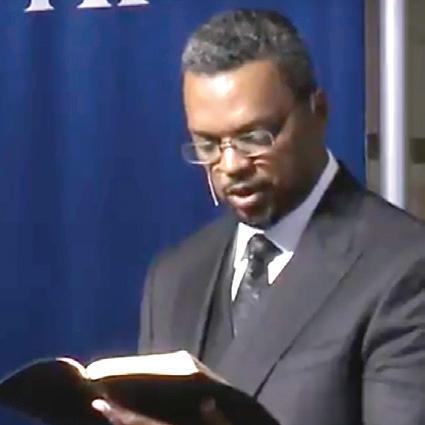
“We have to avoid ignorant controversy— and our world is full of ignorant controversies,” he said. “All you have to do is open up your Twitter feed and see all the ignorant controversies of the morning.”
Robinson said it’s important to realize the world likes to argue about everything just for the sake of arguing. But in their pursuit of purity, God’s people should correct “opponents with gentleness, so that God may perhaps grant them repentance leading to a knowledge of the truth” (2 Tim. 2:25).
“There goes your excuse for writing off everyone that disagrees with you,” Robinson said. “Don’t throw people away. Don’t look for reasons not to engage with them. Pursue patience. Teach them the word of God. It may be that God is using you to set them free and bring them out of darkness into the marvelous light.”
For a long time now, I’ve made it my practice to read the Bible through each year, highlighting as I go. This “bulk reading” of the Bible helps me to see the big picture of God’s redemptive work in our world. I drill deeper into the Word as I memorize verses and prepare to teach. Prayer has become increasingly meaningful to me as well, and I want it to be part of my morning devotions and my allday attitude. Nothing can replace my time alone with God.
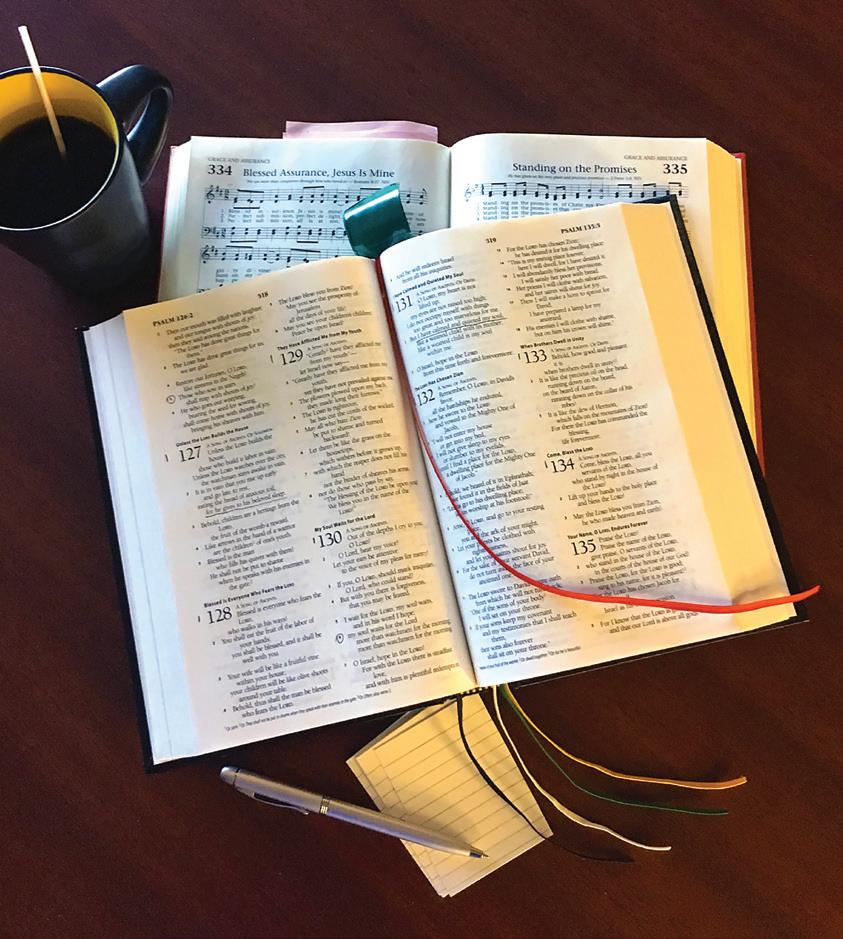
In the past I have used George Guthrie’s “Reader’s Guide to the Bible,” a chronological reading plan through the Bible. I have had some of my greatest “aha!” moments using this book as a strategy for reading through the Bible.
Studying goes deeper than mere reading…. Skimming over large areas of truth is not so profitable as the careful turning of every passage.
Several years back, I found my Biblereading plan bogged down somewhere in Leviticus or Numbers. It happened more than once, and I never seemed to catch up with the reading schedule or with Jesus over in the Gospels. I switched to the “start with John” plan, but wasn’t sure what to read after that. Then I happened on a colorful solution at the bookstore.
I found a bookmark with five ribbons in different colors. Using the bookmark to keep my place, I divided the Bible by genre, and slipped in a ribbon at the beginning of each section:
History (Genesis-Esther)
Wisdom (Job-Song of Solomon)
Prophets (Isaiah-Malachi)

Gospels (Matthew-Acts)
Epistles (Romans-Revelation)
Now, when I read devotionally, I read five chapters, the next one in each section, and mark each with a small check. I’m still on my first trip through some sections because they’re longer, but I’ve started the Gospels and Epistles over again. This system always keeps me walking with Jesus, and it’s amazing how the chapters in various sections relate to each other on any given day.
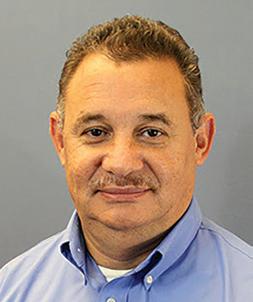
I usually begin my “quiet time” with the prayers from Ephesians 1:15-23 and 3:14-21. Then I—
• Read a chapter of Proverbs or a Psalm each day.
• Read one Old Testament chapter each day.
• Read one New Testament chapter each day.

• Journal as the Holy Spirit prompts.
• The things I write down become my prayer prompts for that day.
I’ve been challenged by insomnia over the past few years, and my doctor recommended books on tape. I went him one better and began to listen to Scripture when I go to sleep or wake up in the wee hours. That’s been a blessing as I can listen to different versions of the Bible via Biblegateway.com.
If I had a book which I did not quite understand, it would be a very great convenience to me to live next door to the author, for then I could run in and ask him what he meant. This is just your position, Christian! The book will sometimes puzzle you, but the divine author, who must know his own meaning, is always ready to lead you into its meaning!
I was so happy with the system that I added a similar trip through the Baptist Hymnal to my devotional life: Open with the next hymn as it comes in the hymnbook, and end with a hymn of the week from a list of 50 I want to keep fresh in my memory.

It takes about a half-hour most days, plus prayer time. And I find I’m no longer worried about getting stuck in Deuteronomy.
Amanda Hubert Delta Church, Springfield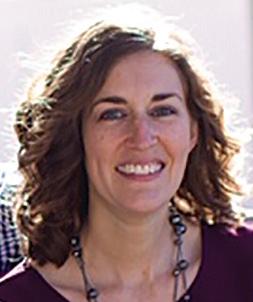


I’m currently using the reading plan my discipleship group is going through called F260, which is a 260-day reading plan from Replicate Ministries that highlights the foundational passages of Scripture. Along with reading, the plan includes Scripture memorization, journaling, and prayer.
We introduced this plan last year at our Refresh conference for ministers’ wives, and I’ve recommended it several times to women. They have their own app, and you can also find F260 on the YouVersion Bible app.
Obtain for use a good Bible, a concordance, and a topical text-book….They form a complete library, and by their aid the Bible can be studied with profit. Watch
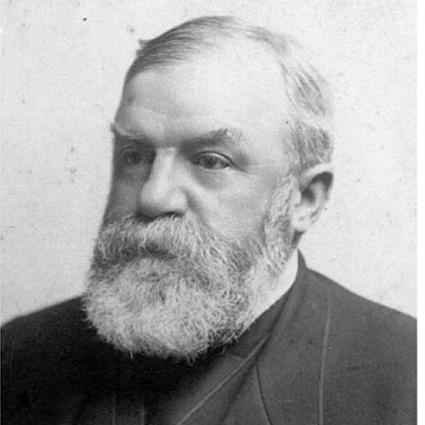
I am using the Legacy Reading Plan, which has set books for each month and a set number of Proverbs and Psalms to read each week. It aims to give you more flexibility, while grounding you in specific books of the Bible each month.
This stage of life with little kids doesn’t leave a lot of extra time for in-depth study. Most days, I attempt to read 3-4 chapters a day (one from the Old Testament, one Psalm, one from Proverbs, and one from the New Testament).
I try to start my day by reading even just a few verses. If I can’t finish what I’d like to, I listen to my ESV app while prepping dinner, during nap time, etc. I try to think on and memorize verses in my planner too. God uses what we have to give, even if it is only five minutes. His Word does not return void!
Considering the global gospel need, sending a small percentage of the local church’s weekly offering to SBC missions may seem like a drop in the bucket. But it’s much more!
Baptists in Illinois give about $6 million to Cooperative Program missions each year.

43.5% goes to the national SBC for missions, church planting, and
56.5% is used in Illinois to grow churches, start new churches, and equip Baptists for missions, discipleship, and evangelism.
When your church gives a percentage of the weekly offering to missions through CP, the ripple effect is felt all over the world.
Share this information with your church. Download it in 8
IBSA.org/CP

The generation that changed everything is changing its mind. Growing numbers of Boomers are interested in church again.
BY MEREDITH FLYNN CRAINThe Boomers are coming! The Boomers are coming! Thom Rainer exclaimed as he reported new research showing that one-in-five Baby Boomers are more interested in spiritual things than they were earlier in their lives. One-in-five Baby Boomers represents about 19 million people, the president of LifeWay Christian Resources noted—presenting the church with a huge opportunity for growth and new ministry. But the trend also means an increase in needs— for evangelism, discipleship, and intentional relationship-building. Many Boomers aren’t coming back to church as fully-formed Christians ready to participate in outreach ministries. They have questions. They can be skeptical.
Chaplain Matt Crain led a multigenerational church in southern Illinois before becoming a chaplain at Shawnee Christian Village in Herrin. At his church, Crain said, it was the Boomers who acknowledged, “I’ve been out of church for 20 years. And I’ve got a friend that said I really ought to try this.

“But I want you to know, pastor, I may not be back.”
Boomers may not be coming back to church in big waves yet, Crain said, but they have renewed interest and “they want to see if anything’s changed.”
The children of the 60s who fought hard for social change are also held responsible for the

Getting their (spiritual) groove back
The kids from The Brady Bunch remind us that time marches on, even for the forever young generation. The cast, now ages 57 to 64, is pictured in 2018 outside the North Hollywood home that inspired architect-dad Mike’s iconic split-level ranch.

Continued from page 7
ballooning the national debt. They’re “tanned and healthy and living way past average life expectancy,” Philadelphia Magazine reported. They also face financial and health crises avoided by the generation before them, Crain said.
“There is just under the surface an undertow current of ‘Wow, I see my own mortality now, and my health is beginning to fade,’” Crain said. “Am I going to have any legacy? Will it matter that I was here?”
Helping Boomers answer those questions is the church’s challenge— and an historic opportunity.

Prodigal generation
Boomers fill an interesting middle ground in American culture. Most were raised with a foundation of values straight out of Mayberry. But the tumult of their formative years took them far away from the comfort of Aunt Bea’s kitchen. In ways physical and spiritual, they moved away from what they knew as children, and raised their own families (which many started later in life than their predecessors) with new values.
spiritual roots highlighted three reasons for the shift: more time on their hands, a realization of the brevity of life, and an awareness of life’s fragile nature. There are currently more than 70 million Baby Boomers, but data from the U.S. Census Bureau shows the group will shrink to 16.6 million by 2050.
It’s in this environment that the church can help meet practical needs of Boomers, as well as spiritual ones, Crain said. The simple things a church does to help a Boomer improve his or her quality of life can build relationships that can lead to gospel conversations. Encourage physical health, diet, and exercise, Crain suggested, or offer to take someone to a doctor’s appointment.
And when Boomers do come to your church, he added, they may be surprisingly nostalgic. “They are OK with singing some hymns,” Crain said. “They might put it to a new beat and add a couple of instruments…remember, they are children of the 60s.” In other words, don’t forsake “The Old Rugged Cross,” but jazz it up.
At 62, Pastor Bob Dickerson is on the younger end of the Baby Boomer spectrum. But he identifies with a generation closer to the end of their lives than the beginning, and wanting to use their time well.
“I want to finish well,” said Dickerson, pastor of First Baptist Church in Marion. “I’m not going to accept just ‘doing stuff,’ because I don’t have enough time left to just do stuff.” Dickerson, and many fellow Boomers, want to see results from the things they do. They want what they undertake to matter.
The sheer number of Baby Boomers makes them a force to be reckoned with, especially for churches tasked with the Great Commission to make disciples of all nations (and ages within them). But they’re not the only generation in need of Jesus. Reaching them may provide churches with new potential for multi-generational worship and discipleship.
“Most of your Baby Boomers long for cross-generational experience,” Crain said. “They may not have learned how to do it, but they want to do it.” He encouraged churches to look for ways to connect people of different generations that are less about programming and more about building friendships.
Boomers are worried about their children and grandchildren, Dickerson noted. FBC Marion encourages opportunities for older adults to interact with youth, and to serve as surrogate grandparents to kids in need of them.
But as they reach the later stages of their lives (the first Boomers turned 65 in 2011), they’re thinking about what really matters. And in some cases, they’re returning to a form of the faith they were raised with— although it may be more about personal spirituality than organized religion.
“We have seen some Boomers thinking more about eternity and about what really matters most in life,” said Doug Munton, pastor of First Baptist Church in O’Fallon. Boomers have the same spiritual needs as other generations, he said— a personal relationship with God through Christ, forgiveness of their sin, and meaning and purpose for their lives.
“They want to know what matters most deeply and how they can find that,” Munton said.

The research that showed Baby Boomers might be returning to their
At FBC Marion, retirees minister at the local homeless shelter. They’re involved in Disaster Relief. The church’s JOY choir of 70-80 older adults put on their first Christmas concert this year for an audience of more than 400. (JOY stands for “Just Older Youth.”)
Crain cited North American Mission Board church planting specialists who have noted the similarities between Boomers and their children. “Baby Boomers and Millennials are alike in the sense that they’re concerned with acts of love, kindness, justice, and mercy,” he said. “They want to know: What are you doing for our community? What are you doing for someone who can’t repay you?”
Even before they’re believers in Christ, Crain said, “they will jump into an opportunity to bless someone.” And once they’re in the church, their need for meaningful action is a warning for church leaders. “I can’t just make them ushers,” Crain said. “That’s not going to scratch that itch. They want to know, ‘When are we going to help somebody?’ That’s really important to them.”
Amy Hanson is the author of “Baby Boomers and Beyond: Tapping the Ministry Talents and Passions of Adults Over 50.” She noted the similarities between Boomers and Millennials (generally, adults born 1981-1996) in an 2017 interview with the National Association of Evangelicals.
“They both care about social justice issues and making a difference with their lives,” Hanson said. “Both have an entrepreneurial spirit and are not afraid to try new things. Both groups are technologically savvy, and both are interested in strong friendships that cross generational lines.
“Focus on these things. Don’t be afraid to put people together and see what happens.”
The potential of a Baby Boomer boom in churches is a reminder of the call to reach all people with the gospel, regardless of age. Especially when presented with so great an opportunity, Thom Rainer urged leaders.
“Please, church leaders, don’t take this information lightly,” he wrote. “I can’t recall a generation in my lifetime potentially returning to church in such numbers.” The opportunities are incredible, Rainer said, “maybe they are groovy.”
There’s no time in living memory when there have been so many vacancies at the top of key SBC entities. The election of Paul Chitwood to the presidency of the International Mission Board in November fills but one of five vacant posts. Two seminaries (New Orleans and Southwestern), the Executive Committee, and LifeWay Christian Resources are all engaged in president searches right now.
There was a period of turnover after World War II that stretched over several years, and, of course, the Conservative Resurgence that swapped out leaders and philosophies of SBC entities over more than a decade. But this shifting of leadership gears represents the greatest change in the shortest time in living memory.
What is the effect of all that change in executive leadership?
The election of David Platt, then 35, to head the International Mission Board in 2014 prompted this question, but his departure this year means we have to ask it of another young leader, J.D. Greear, instead: What will be the impact of this young pastor on senior leadership in the SBC?

In any organization, changes at the top mean changes in philosophy and style, the departure of some second-tier leaders and rearrangement of others, and—in general—a season of optimistic uncertainty.
People are glad there’s a new leader but unsure where that leaves them, and they are wondering about the new direction of the organization.
Multiply that times five, and the ripple effect is felt across the Convention.
If we consider the last round of changes at the top of the International Mission Board, the North American Mission Board, and LifeWay—and how long it took for the new leaders and their new plans to settle in—the SBC as a whole may be looking at two or three years of choppy water.
It’s probably too early to talk about his legacy, since he’s only six months into his first term as SBC president. It won’t be until the nominations for denomination committees are made in June that the presumed influence of Greear’s Reformed theology—as implemented by his likeminded peers—will be known. And we can only assume, based on a few comments he’s made, that his reluctance to embrace populist U.S. politics will mean an annual meeting with less public support for the Trump administration.
So far, we have only seen some public statements in support of Cooperative Program, and in November, a challenge to raise giving to the Lottie Moon Christmas Offering for International Missions by $10 million, surpassing IMB’s goal of $160 million. If giving reaches $170 million, Greear has pledged to engage in some kind of stunt in celebration.
The nature of the stunt is unknown, but Baptist Press reports, “suggested stunts include singing a duet with newly elected IMB President Paul Chitwood, arm wrestling Chitwood, performing a Broadway number, taking a pie in the face, and sporting a mullet at the SBC annual meeting.”

Signs are the Greear Effect seems, at this point, more youth-ministry than missional in nature. With four SBC entities still seeking head leadership (LifeWay, Executive Committee, and Southwestern and New Orleans seminaries), perhaps it will be in his second one-year term (if reelected) that Greear really makes his mark on behalf of a younger generation.
Questions surrounding women in the church came into sharp relief in 2018 on the heels of #Metoo. Southern Baptists struggled through their own version of the movement, resulting in the termination of a seminary president and public investigations of pastors and missionaries accused of sexual abuse. Amid the scandals, women leaders denounced abuse and also prescribed preventive measures for churches and pastors.
MOOREIn “A Letter to My Brothers” in May, Bible teacher Beth Moore called out misogyny of any kind among believers in Christ. “One of the most demoralizing realizations of my adult life,” Moore wrote, is “Scripture was not the reason for the colossal disregard and disrespect of women” among some key Christian leaders. “It was only

Christians remain one of the most persecuted religious groups in the world, according to watchdog group Open Doors. On average, 255 are killed every month, 160 are imprisoned, 104 are abducted, and 66 churches are attacked.
In 2018, more Christians were displaced by violence in Nigeria. In China, the government intensified its crackdown on churches. American awareness of persecution was heightened by the murder of John Allen Chau, a young missionary killed while trying to share the gospel on North Sentinel Island.

Chau’s death sparked a variety of responses among Christians regarding evangelism
the excuse. Sin was the reason. Ungodliness.”
Moore and others, including Texas Bible teacher Jen Wilkin, have called both men and women to more fervent Bible literacy, and to a reexamination of how men and women are called to build the church—together.
“The women e-mailing me regularly are not worried about winning the pulpit,” Wilkin wrote in 2015. “They are looking for leadership trajectories for women in the local church and finding virtually nothing. They watch their brothers receive advocacy and wonder who will invite them and equip them to lead well.”
As the dust settles on an unsettling movement, Baptists and other evangelicals still have questions to answer about what it really means for men and women to be made in the image of God, and treat each other as such.
and appropriate missiology. While his approach was debated, his commitment to take the gospel to a difficult place served as a reminder of the call to pierce darkness with the light of Christ.
In letters before their arrests in early December, Chinese church leaders Li Yingqiang and Wang Yi encouraged their church to remember the words of Paul and rejoice in the midst of persecution, and not to count it strange. The letters also assured the church that “civil disobedience” is acceptable in order to “never stop testifying to the world about Christ.” Their words, and Chau’s example, challenge American Christians to pray for the persecuted and to take a new look at their own calling in Christ.
With the first Trump term at its midpoint, several questions face evangelicals: How do they view the president now, in light of increasing scrutiny over his ethical and legal behaviors and the pending special counsel’s report? And, in contrast to Trump, how do evangelicals feel about Vice President Mike Pence?
Self-described as both evangelical and Catholic, Pence has managed to stay above the fray mostly, while appealing to Republicans’ traditional faithbase. “We know that what you do in the ministries of your churches make an extraordinary difference in the life of our nation…” Pence told Southern Baptists in June. “You’re the cornerstone, not just of your communities but, in so many ways, of our country.”
Some wonder if Pence has his own presidential ambitions. In May, the New York Times reported while “[the President is] mostly uninterested in the mechanics of managing a political party” his “supremely disciplined running mate has stepped into the void.”
The Times also noted that while the two previous Vice Presidents “have played important roles maintaining the political coalitions of their ticketmates, neither man wielded Mr. Pence’s independent influence over an administration’s political network and agenda,” referring in part to his networking with evangelicals on Trump’s behalf—and perhaps his own.

In a year that saw a vicious, partisan fight over a U.S. Supreme Court nominee with a pro-life record, many were surprised by that new justice’s decision in a life-related case.
The Court announced Dec. 10 it would not review decisions by lower courts in Kansas and Louisiana that require Medicare to remove Planned Parenthood as a patient provider. Controversial new Associate Justice Brett Kavanaugh joined more moderately conservative Chief Justice John Roberts and liberal justices in refusing to consider the lower court rulings.
Associate Justice Neil Gorsuch, Trump’s previous Court pick, joined conservative Justices Clarence Thomas and Samuel Alito in filing written dissents of the High Court’s decision. Kavanaugh’s move has caused many to speculate that he may be a more moderate influence on the Court than originally thought.
In the nearly three months since Kavanaugh joined the Court, he and Gorsuch have differed on rulings concerning abortion, immigration, and the environment, USA Today reported. “There’s a pattern here that you can’t ignore,” Curt Levey, president of the conservative Committee for Justice, told the newspaper. “It corresponds with our prediction for Kavanaugh, which is that he would be more like Roberts.”
The last few years have seen an increase in the number of public conversations Baptists are having about race. Sparked in large part by shootings of unarmed black men by law enforcement, churches have been confronted by an urgent question: How does the Bible call us to respond, both in the short-term and going forward?

In 2018, several state conventions answered by adopting resolutions on racial harmony. Missouri Baptists denounced the 1857 Dred Scott decision by the U.S. Supreme Court, which determined a freed slave was not an American citizen.
In Charleston, S.C., South Carolina Baptists held one session of their annual meeting in the AfricanAmerican church where nine people were killed by a self-proclaimed white supremacist in 2015. The meeting’s theme, “Building Bridges,” spoke to the convention’s commitment to healing racial divides.
In Illinois, IBSA President Adron Robinson urged Baptists in the state to overcome “growing pains” and feelings of superiority that can result in division. “Salvation has never been about race,” he preached, “but it’s always been about grace.”
Especially in the Southern Baptist Convention, conversations around race tend to land on leadership. Are SBC committees and trustee boards truly representative of the entire SBC family, when
After illegal border crossings declined in 2017 to a more than 40-year low, the numbers began climbing again in 2018. This included a recordsetting number of people from Honduras, Guatemala, and Mexico traveling in September in a caravan toward the border.
Earlier in 2018, when the Trump administration attempted to deter immigration, migration declined. The government’s zero-tolerance policy ramped up criminal prosecution of anyone entering the United States illegally. But when 3,000 children were separated from their arrested parents, the policy came under attack, including a public letter of protest written to the administration by evangelical leaders.

“As Christians, we should share the heart of Jesus for refugees and others imperiled,”

recent estimates show about one-fifth of SBC churches have non-Anglo majority memberships?
SBC leadership made an effort last year to increase minority representation on boards and committees. Another key area to watch in 2019: the filling of presidential vacancies at four Southern Baptist entities.
said Russell Moore, president of the Ethics and Religious Liberty Commission.
“Those escaping violence and persecution in Honduras and elsewhere bear the image of God and should be treated with dignity and compassion.”
An executive order officially halted family separations in June, but immigration policy is still in limbo, a fact highlighted by a December court decision that grants those crossing the border illegally the right to seek asylum in the U.S. With its current trajectory, migration is expected to grow in 2019—increasing the challenge for the church to offer a biblical response to an increasingly volatile problem.

At face value, “social justice” doesn’t read like a particularly controversial term. It can ruffle feathers in church life, though, especially when connected to a social gospel that downplays repentance.
After the Ethics and Religious Liberty Commission convened an April conference commemorating the life and legacy of Martin Luther King, Jr., some Baptists expressed their opposition to social justice causes they said could water down the gospel. After that, well-known non-Southern Baptist John MacArthur and other leaders released a statement expressing concern “that values borrowed from secular culture are currently undermining Scripture in the areas of race and ethnicity, manhood and womanhood, and human sexuality.”
Baptist reaction to the statement was mixed. With race and gender poised to remain key areas of challenge for the forseeable future, the opportunity for churches is to dive deep into a difficult question: How do we stay biblically faithful and still engage our community, and the larger culture?
january 20: sanctity of human life sunday
Justin Phillips said it’s the best and worst thing he’s ever done with his life. Every day, he stands across the strip mall parking lot from a door marked simply G-3422. It’s sandwiched between two dollar stores.
Every week, 20 to 30 babies are aborted there.
“We’re out there pleading with moms and dads to have mercy on their child, and we’ll help,” said Phillips, a full-time missionary with ONElife for Life, a ministry of ONElife Church in Flint, Mich.
Since ONElife for Life began in May 2016, dozens of babies that they know of have been saved out of G-3422. And the ministry has grown, said Eric Stewart , pastor of ONElife Church and president of ONElife for Life. They’ve acquired a building next to the strip mall that will be a pregnancy resource center and they’ve been given a bus that will be used as a mobile ultrasound.
They’ve also expanded their reach to conversations outside a second abortion clinic in town.
It’s been slow growth. Stewart’s big-picture goal is for Christians to have a presence outside each of the nation’s 720 abortion clinics. Right now, ONElife for Life is covering two.
Stewart and Phillips have been speaking in churches in recent months trying to awaken a desire to pick up the mantle. When he speaks, Stewart said the first thing he does is ask the church he’s visiting to repent with him.
“For years, I did nothing, but if it’s really murder, then we have to face that reality,” Stewart said. “If someone drove into our town and wiped out an entire kindergarten class every week, we wouldn’t sit idly by and say, ‘It’s not affecting me.’”
The story of the Good Samaritan demands the liability of the bystander, he said.
In 2015, more than 638,000 abortions were reported in the U.S. ONElife Church is working to lower that number by establishing a ministry of presence outside abortion facilities in their community. In the photo above, ONElife missionary Justin Phillips holds a baby saved from abortion.
For Sanctity of Life resources, go to ERLC.com.

Evangelical bioethicists have joined many of their secular peers in condemning research that reportedly led to the birth late last year of the world’s first genetically edited babies. In addition to echoing secular scientists’ concern about so-called “designer babies,” the evangelicals objected to destruction of embryos which occurred in the gene-editing process.

Chinese scientist He Jiankui led the project to edit the genes of twin girls whose father has HIV. The gene editing was meant to protect the girls from contracting the virus, the scientist said in a video statement.
Scientists who reviewed materials He provided to the Associated Press said they could not confirm the gene editing worked, or rule out that harm was done to the twins.

“Here is another instance where the cautionary principle should give us pause,” Southern Baptist bioethicist C. Ben Mitchell told Baptist Press. “We are not tinkering with plants and animals, as considerable as that might be, but with human beings. Not only should we proceed with extraordinary caution, but we should not move ahead without the assurance that we could reverse any augmentation we make. Worse than a lethal genetic mutation would be a lethal genetic mutation we engineer in ourselves, even if our motives are good.”
For the allegedly successful birth of the twins, 22 embryos were created via in vitro fertilization, 16 were edited, and 11 were used in six implant attempts before pregnancy was achieved, AP reported. While AP did not specify what happened with the unused embryos, bioethicist Joy Riley, executive director of the Tennessee Center for Bioethics & Culture, told Baptist Press they presumably were destroyed or frozen, both morally problematic outcomes.
Riley, a physician, told BP that He’s research is “morally problematic” and seems to be “a product of not seeing a human as more than his or her genes.”
“We are created in the image of God, and that’s far, far more than just our genetic makeup,” Riley said. “When we start picking and choosing which genes we want to continue having, we are taking part in an experiment that is not ours.”
– From Baptist Press
Continued from page 11
Stewart said he thinks about it all the time, ever since he heard a story about how one particular church in Nazi Germany would sing louder on Sundays so they wouldn’t have to hear the trains chugging by on the way to the concentration camps.
“We hear that story, and do we not wish that there would have been Christians who went to the point of injustice and said, ‘No, we can’t let this happen,’” Stewart said. “We have our opportunity now. We are living in the American holocaust and we have the opportunity to [speak] in Christ’s name.”
For churches interested in being involved, Stewart and Phillips can provide training in how to start a ministry like ONElife for Life and have conversations with people outside abortion clinics. They aren’t there to protest, Stewart said. They’re simply there to show love and offer mothers the help they need to bring a baby full term.
“We want to equip the church. We’ve learned how to train people to do this kind of ministry—we’ve learned from our own mistakes and would love to pass that along so that people don’t have to reinvent the wheel,” Stewart said. “We’ve thrown our lives into this, and we would love to duplicate it all over the place. We need gospelsaturated missionaries to confront the darkness and abolish the evil of abortion. It really is a life-or-death situation.”
There’s an emotional toll to the ministry of standing at a “modern-day concentration camp,” Stewart said. There at their tent across the parking lot, Phillips and volunteers from the church have conversations with anyone who will talk to them. They offer to adopt the baby or cover any financial needs the parents might have for the baby’s first three years of life. They remind each mother that God knows the baby in her womb.
Sometimes those babies are still aborted. “But we’re compelled to go because we’re told to go to orphans in their distress, and these children have been disowned by their parents,” Phillips said.
And at least 85 have been saved. It could be more. They only know about it if a tearful mother meets them there on the edge of the parking lot and tells them she’s
decided not to go through with it, or if the parents later choose to swing back by and let them meet the baby.
“Every month we have people who come back and say, ‘Hey, I never said anything, but here’s my baby,’” Stewart said. “So we know there’s probably more.”
God is at work there, shining light into the darkest of places, Phillips said. “We just stand there and watch him move. It’s all him. He brings people to us and saves babies all the time.”
One woman told Phillips that she didn’t want to talk to him, but her legs just walked her over there. After talking with him, she chose not to go through with it.
“It’s a battlefield all the time, and it’s an honor to stand there proclaiming a message of hope,” Phillips said. “We do that, and God does the rest. We can’t change hearts, but he can.”
It hasn’t been without pushback. Sometimes the clinic will have people posted in the parking lot to “shepherd” women into the building so they won’t have conversations with Phillips. Other times people have approached him with threats.
But in Christ, Phillips said he knows he goes out victorious already.
“It’s a horrible ministry, horrible to watch it every day,” he said. “But at the same time, to be able to lay down our lives in that way on behalf of Christ and his love for these babies is incredible.”
For more information about ONElife for Life, visit onelifeforlife.org.
Grace Thornton is a writer in Birmingham, Ala. This article is originally from Baptist Press, online at BPNews.net.

“It’s a battlefield all the time, and it’s an honor to stand there proclaiming a message of hope. We do that, and God does the rest.”
– Justin Phillips, ONElife for Life
RILEY
I never thought I would be so moved while attending my first IBSA Annual Meeting, but when we voted as the church to be compassionate toward those experiencing infertility, I melted.
Messengers to the meeting in Maryville last November voted to acknowledge the many trying aspects of infertility for couples, and the church’s appropriate response to such a struggle. They recognized that infertility is a result of the first sin, and that the medical routes couples take to overcome it do not go against God, based on Scripture.
The resolution encourages the church to do all they can so these couples are not left out of church life because of their infertility, and urges churches to help those who yearn to be parents through the struggles, decisions, and heartbreaks they will undoubtedly encounter. Finally, the resolution asks the church to surround these couples as the family of God, reminding them that all of these problems can be overcome through Christ.
As a woman, wife, and hopeful mother who has struggled with infertility for the past two years, this resolution did my heart good. At last! The most pressing problems my husband and I have faced in our marriage had been acknowledged in a public forum… in the one place I struggled to find clear support for us as a couple.
Please don’t misunderstand me—our church family has loved us through our problems, but in many ways, the church is lacking empathy for those living the childless-not-by-choice life. It’s not necessarily the regular churchgoer’s fault. I believe our biggest issue in searching for support through our infertility has been educating those around us.
If people have never faced trouble growing their family, they simply don’t know what to think, so they say whatever platitude comes to mind, unintentionally resulting in deeper emotional wounds for those building their family non-traditionally, rather than tenderly nursing those wounds as Jesus did.

I’m not here to bash the church. I grew up in the church. I’m a pastor’s kid who looks at her time in ministry as a blessing, and I love my past and current church family dearly. They have blessed me in ways I never saw coming—and I only hope I can serve my church family in kind through our time
together. Instead, could I share some ways the church can learn to care for those in the infertile world?
1. Listen. Many couples struggle privately—which is their choice and right. But I believe many couples would choose not to struggle alone if they felt their church family would be receptive listeners, rather than inexperienced advice-givers.
2. Don’t give advice. Unless you have lived through infertility, and even sometimes if you have, please do not make suggestions to couples struggling to grow their family. The endless replies of “just relax” and “why don’t you just adopt?” are not helpful when someone is in this stressful place. More often than not, these couples will be up to their ears learning new medical jargon, procedures, and options—both traditional and unconventional. Believe me, they are informed.
3. Educate yourself. Maybe this includes hosting a class for your church leadership. If a couple is open about their infertility experience, perhaps they
would like to share their personal story in order to help others understand. If no couple is available, you could reach out to a nearby infertility specialist or infertility counselor and ask them to give a presentation at your church. Either way, search online; there are plenty of resources, including Moms in the Making and Sarah’s Laughter, both of which have given me hope over the years.
4. Offer support. Similar to the way your church family would support a member who is grieving the death of a loved one, support those struggling through infertility. They are mourning the picture of life they dreamed of for years. They are floundering through so many hard decisions they must make to pursue a family, whether biological or adoptive. They need your love. They need your care. They need to know they are not alone.
Not every couple that experiences infertility chooses to pursue treatment. These couples need support too. Don’t forget them. As I write this, our struggle to conceive has ended for now. My husband and I are due to have our baby in June 2019. Praise the Lord! This is not our first pregnancy, though. We lost our first child to miscarriage on Dec. 3, 2017. Please pray that we may still find joy throughout this pregnancy, and that we can trust God no matter what tomorrow brings.
Leah Honnen is the administrative assistant for IBSA’s Church Communications Team and an active member of Lincoln Avenue Baptist Church. She and her husband, John, live in Jacksonville.
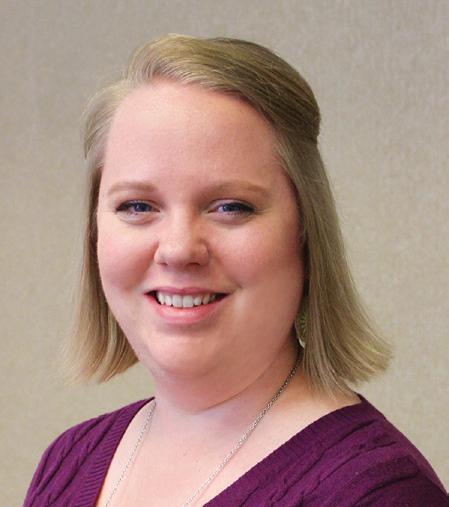
Read: Matthew 1:21
As we wrap up Christmas, we have to be careful that we don’t throw out the miracle with the tinsel. In all the celebration, the holiday’s greatest blessing can become routine to us. And if we are not careful, the rush to buy gifts, decorate, and attend parties can cause us to miss the miracle of Christmas. The challenge is even greater after we take down the tree.
That’s why it is good to review the first Christmas because everything about the first Christmas was miraculous. It was a miraculous birth. The second person of the Trinity became flesh. Can you imagine that: Divinity, wrapped in humanity; eternity, encased in a temporary container. It’s hard to wrap your mind around it, but that’s the miracle of Christmas. God came down to man, because man couldn’t get up to God. He was given a miraculous name. The name “Jesus” fits the mission of this miracle child, it is the Greek form of the Hebrew name Joshua. Jesus means “God saves.” He was sent to show the world that God saves. And there is salvation in no other name (Acts 4:12) because Jesus is salvation.
Finally, he offers the world a miraculous gift, “for he will save his people from their sins.”
God in his wisdom knew it takes incarnation to bring about salvation, he knew the world needed an encounter with God in the flesh in order to experience his glory, full of grace and truth. So he sent us Jesus.
When we give someone a gift, we like to hear them say, “That’s just what I wanted.” But when God gave this gift, he knew it was just what we needed! So, if you want to retain the joy of Christmas in the new year, then share the miracle of Christmas all year. Let someone know God loves them so much that he gave them what their soul needs most—a savior, Christ the Lord.
Prayer prompt: Father, in your wisdom you have provided the gift every one of us needs. Help us to cherish your gift and never take Christ for granted. And lead us to share the miracle of Jesus, because the whole world needs this gift.
Adron Robinson is pastor of Hillcrest Baptist Church in Country Club Hills and president of the Illinois Baptist State Association.

They need to know they’re not alone.An idea for a new sermon gesture can strike a pastor at any time.
leaders
Conference aims to encourage pastors
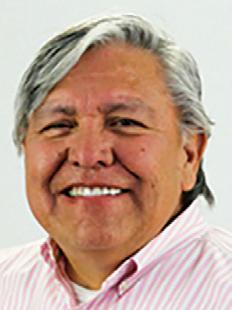

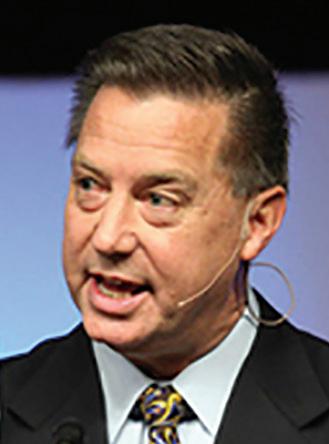
A two-day conference this spring will support the spiritual growth and health of pastors. Preach 2019 is scheduled for March 11-12 at Meadow Heights Baptist Church in Collinsville. Speakers include:
Eddie Bumpers, senior pastor of Crossway Baptist Church in Springfield, Mo., on “The Preacher and His Praying”
Fred Luter, senior pastor of Franklin Avenue Baptist Church in New Orleans and former president of the Southern Baptist Convention, on “The Power in Preaching”

Bob Ingle, lead pastor of First Baptist Church Harvester in St. Charles, Mo., on “Living with Character and Integrity”
Chadd Pendergraft, senior pastor of Crescent Valley Baptist Church in Tahlequah, Okla., on “God’s Kind of Leader”

Frank Whitney, senior pastor of Union Hill Baptist Church in Holts Summit, Mo., on “The Evangelist and His Evangelism”
Ted Burden, directional lead pastor at Fellowship Bible Church in Rogersville, Mo., will lead music at Preach 2019.



The free conference is open to pastors, staff, and lay leaders from all regions and denominations.
Meals and lodging are on your own; a special rate is available for conference attenders at the Four Points by Sheraton in Fairview Heights—(618) 622-9500. Mention the Preach 2019 conference to receive the discount.
Complimentary childcare will be provided for kids five and under. Older children are welcome to join their parents in the conference.
To register, go to preachconference. com. For more information, contact Meadow Heights at (618) 344-4982, Pastor Robert Strong at preach@ preachconference.com, or go to Facebook.com/PreachConference or Twitter.com/preachconf.
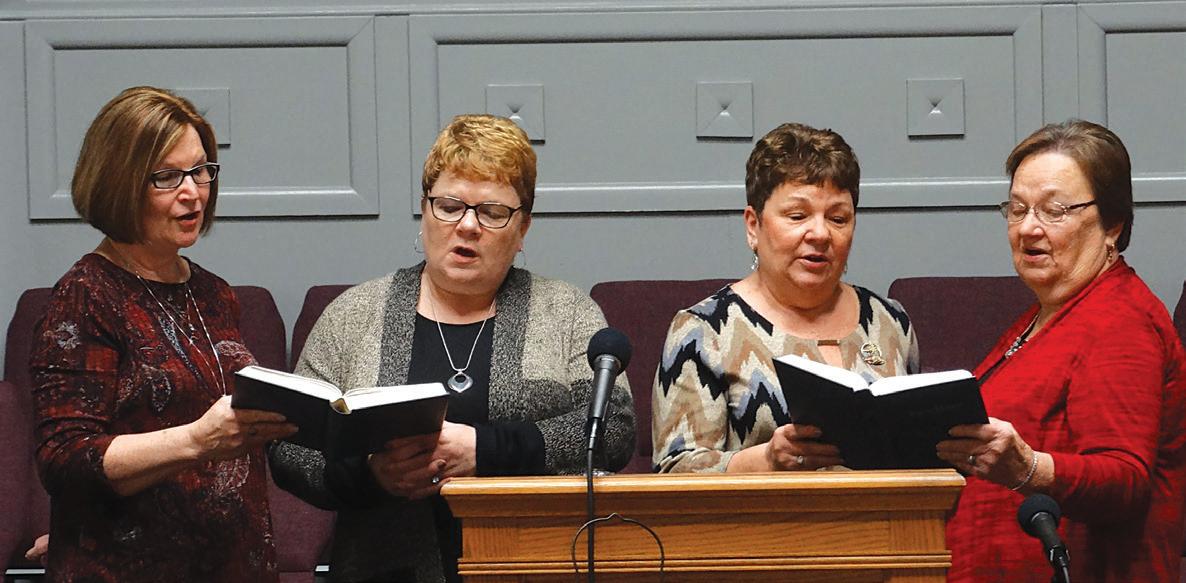
Several IBSA churches marked ministry milestones last year. Among them: Calvary Baptist in Effingham celebrated their 50th anniversary in November; Heartland Baptist in Godfrey marked 50 years in September; and First Baptist, Orion, which affiliated with IBSA at the Annual Meeting in November, celebrated 175 years in October.
Ronnie Tabor is the new lead pastor at Temple Baptist Church in Centralia. A recent retiree from the U.S. Air Force after 28 years of service, Pastor Tabor served in men’s ministry, discipleship, and sports ministry at First Baptist Church, O’Fallon, while stationed at Scott Air Force Base. Most recently, he was an associate pastor in Ft. Walton Beach, Fla. Tabor and his wife, Carrie, have two sons and two grandsons.
Calvary celebrated Nov. 17-18 with an evening of music and testimonies from current and past church members, and a Sunday worship service praising God for his blessings over the years. The church is led by Pastor Bob Ward, whose friend and fellow pastor Jack Hall preached the anniversary sermon. Calvary is part of the Kaskaskia Baptist Association.
“It’s been a ‘building’ church since they started,” former pastor James Grant told Alton’s Telegraph newspaper of Heartland Baptist in Godfrey. The church’s building has been expanded and improved over the years largely through the work of church members, including a group of retirees known as the ROMEOs (Retired Old Men Eating Out).
The Godfrey church held its “Find us Faithful”
anniversary celebration Sept. 15-16, which included a worship team of current and past members.
Illinois native Russ Stephens recently retired after 46 years of pastoral ministry. He met Jesus at Vacation Bible School at College Heights Baptist Church in Eldorado, and later pastored Union Grove Missionary Baptist in the same town. Throughout his ministry, Stephens served churches in Tennessee, Mississippi, and Kentucky, while returning to his home state for revivals and mission trips. The Tennessee resident is available for revivals and supply preaching in Illinois; contact him at (615) 444-8410, (615) 351-4319, or russ.stephens@att.net.
Pastor Jerry Higdon’s church is one of IBSA’s newest, but the historic congregation celebrated 175 years Oct. 28. FBC Orion, which was approved in November by messengers to the IBSA Annual Meeting as one of 11 churches affiliating with the Association, also celebrated the 100th anniversary of its organ.
NeTworkiNg
Find more information on ministry positions at IBSA. org/connect.
Send NetworkiNg items to IllinoisBaptist@IBSA.org.
Broadview Missionary Baptist Church is seeking a full-time pastor to shepherd the congregation. Interested candidates should visit broad viewbaptist.org for a job description and additional information regarding the resume submittal process.
Contributions received at IBSA by 9 a.m. on Jan. 4, 2019, will be included in 2018 giving. Gifts received after this date will be credited as 2019 giving. Reminder: Remittance forms filled out with designations should be sent in along with checks throughout the year. If you use a bank or service to produce your checks, make designations in memo line.
Contact Kendra Jackson at (217) 391-3111 or e-mail KendraJackson@IBSA.org if you have questions or need assistance.
Park Avenue Baptist Church in Mt. Vernon seeks a bivocational pastor. Submit resumes to parkave@mvpabc.net. For more information, call (618) 316-8965.
First Baptist Church, Dupo, seeks a parttime worship leader to lead two worship services on Sunday, along with directing the adult choir. Send resumes to FBC Dupo, P.O. Box 219, Dupo, IL 62239, or e-mail to fbcdupo@ htc.net, Attn: Pastor.

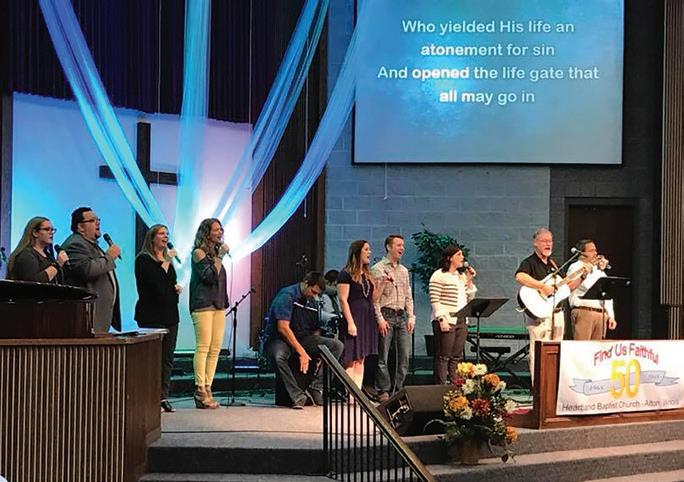
January 1-31
Resources: SBC.net/inallthingspray
January 12
What: Training for worship leaders, vocals, adding percussion, and keyboard
Where: Temple, Centralia; 9 a.m. – noon Register: IBSA.org/worship
January 14, 17, 24
Tax Seminars
What: Valuable tax info for current and retired ministers, treasurers, and other church leaders
Where: Jan. 14: Gateway Association office, Edwardsville; Jan. 17: IBSA Building, Springfield; Jan. 24: Second Baptist, Marion Info: TammyButler@IBSA.org
January 20
Sunday
Resources: ERLC.com
January 22-23
What: Learn how to use worship technology to unite believers in corporate worship. This year’s focus is on sound, worship leading resources, video projection, Ableton, Loop Community, social media, and more.
Where: IBSA Building, Springfield; 8:30 a.m.-1:30 p.m.
Cost: $15 per person, includes lunch
Info: IBSA.org/worship
February 22
Leading on Empty
What: Time of reflection and refueling for pastors
Where: IBSA Building, Springfield Info: LindaDarden@IBSA.org
February 23, March 2
VBS Clinics
Where: Feb. 23: FBC Carterville, March 2: Chatham (additional clinics scheduled later in multiple locations)
What: Training, ideas, and inspiration for 2019 Vacation Bible School Info: IBSA.org/kids
February 28
What: Introduction to IBSA staff, ministries, training, and opportunities, for pastors and church staff members
Where: IBSA Building, Springfield Info: AubreyKrol@IBSA.org
QI like your plan, and I’m ready to get control of my finances. Should I catch up on past due bills before saving $1,000 for the beginner emergency fund you recommend in Baby Step 1?
AThis is a great question, because it gives me a chance to walk you all the way through the Baby Steps plan.
Make sure your necessities are taken care of first. I’m talking about food, clothing, shelter, transportation, and utilities. Then, get current on anything you owe or make payment arrangements for your past due bills. Once you have these things taken care of, it’s time to take your first Baby Step.
You’ve already mentioned getting $1,000 in the bank for a starter emergency fund. That’s Baby Step 1. After that, begin your debt snowball. That’s Baby Step 2, and here you’ll pay off all your debts from smallest to largest, except for your home. Attack the first balance on your list by paying as much as you can each month, while making
minimum payments on your other debts. When you’ve paid off the first one, add what you were paying on it to the payment on your next debt and start attacking it.
In Baby Step 3, you’ll save up and increase your emergency fund from $1,000 to a full three to six months of expenses. Trust me, you’ll be surprised how quickly you can save money when you’ve got all that debt out of the way!
Once you reach this point, it’s time to really start looking at the future. In Baby Step 4 you start investing 15% of your income for retirement. College funding for any little ones is next in Baby Step 5, and Baby Step 6 is a big one— pay off your house early.
But Baby Step 7 is the real deal. When you’re able to build wealth and give with extreme generosity, you’ve reached the pinnacle of smart money management. Good luck!
Financial advisor Dave Ramsey is a prolific author and radio host.

 By Bruce Kugler, SBC Evangelist and author of God’s Courtroom
By Bruce Kugler, SBC Evangelist and author of God’s Courtroom
Next Steps addresses:
What: The premier mid-winter gathering for Illinois Baptist leaders from every region; leaders will learn with and from one another how to expand their leadership skills, and use them to help grow effective churches in our unique context

Where: IBSA Building, Springfield Register: AubreyKrol@IBSA.org
February 2
What: View a rebroadcast of this year’s men’s conference at one of multiple locations
Where: Northside, Dixon; Calvary, Monticello; Woodland, Peoria; Living Faith, Sherman; Bethel, Vandalia; West Side Missionary, Mt. Vernon; Second, Marion; Collinsville Community

Cost: Early-bird registration cost of $15 per person ends Dec. 31; general registration of $25 ends Jan. 25; late registration is $30 Info: IBSA.org/men
March 2
What: Skill training for worship leaders, keyboardists, guitarists, and vocalists
Where: Bethel, Bourbonnais; 9 a.m. –12:30 p.m.
Register: IBSA.org/worship
March 3-10
Annie Armstrong Easter Offering and Week of Prayer for North American Missions
Resources: AnnieArmstrong.com

• Baptism
• Daily Prayer
• Reading the Word of God
• Godly Relationships
• Sharing the Gospel
This simple resource covers the steps a new believer should take that can be read in a few minutes, i.e. the time it takes to drink one cup of coffee.
For more information contact: bruce.kugler@BKuglerMinistries.org or Bruce Kugler Ministries, P.O. Box 350, Sherman, IL 62684
Location: Washington Park
Focus: Residents of this St. Clair County village located just east of East St. Louis
Characteristics: Washington Park is a shrinking community; recent Census estimates have its population at around 4,000. Almost half of its residents are living in poverty.
Prayer needs: Washington Park is a community that needs the power of the gospel. A new church plant would be best served by a bivocational planter who understands inner city life in a challenging context.
– IBSA Church Planting Team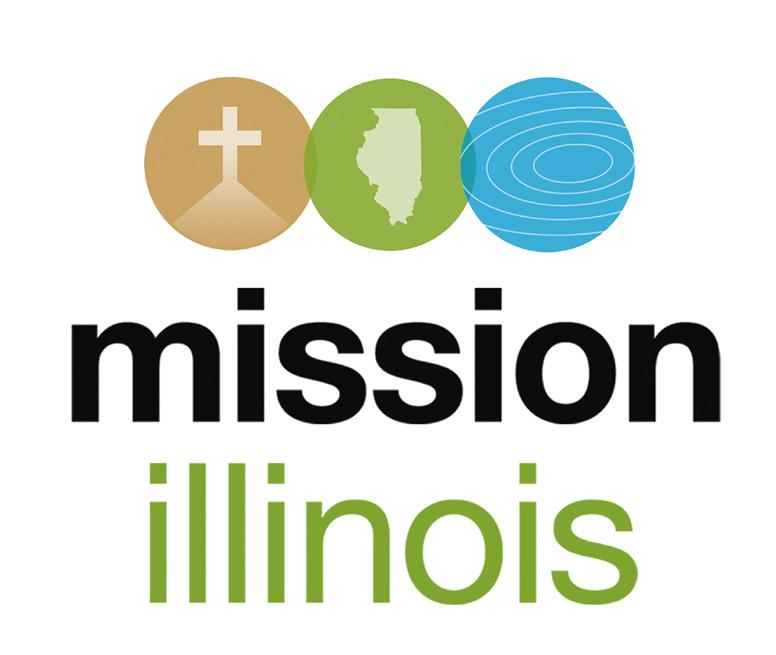
“Perhaps the most important biblical teaching on the Sabbath came when Jesus said, ‘The Sabbath was made for man, not man for the Sabbath.’ Clearly God didn’t need the rest when he modeled it, but humans need to recharge regularly.”
– Scott McConnell, LifeWay ResearchWhen do you Sabbath?
Just over half of Protestant churchgoers say taking a Sabbath is a biblical command that still applies today, but a large majority observe a day of rest during the week:
Hearing that only 2.5% of American churchgoers tithe their income to their local church, we’re compelled to ask, What if every church member gave 10%?
The additional $165 billion would result in a LOT of ministry.
$25 billion could relieve global hunger, starvation, and deaths from preventable diseases in five years.
$12 billion could eliminate illiteracy in five years.
The Easter season is terrific for sharing Christ and following him in baptism. Choose the Sunday in April that works best for your church. Or choose all of them! Illinois Baptist churches are invited to join the month-long baptism emphasis. But sharing Christ with lost people so they can be baptized in April should start soon. Here are some recommendations from IBSA’s evangelism leader Pat Pajak:
Starting in January
Train for gospel conversations
One of the easiest ways to turn everyday conversations into gospel conversations is to use the 3 Circles: Life Conversation Guide. It can be loaded free on to your phone or iPad. IBSA can also provide 3 Circles Training Kits and Student Booklets at no charge to equip church members to simply and effectively share their faith.
Starting in February
Share Christ in the community
Encourage those you trained in gospel conversations or other gospel-sharing activities to share the good news with people they meet. Look for opportunities to reach outside the church walls to share Christ through small group gatherings, basketball leagues, community functions, neighborhood outreach events, family fun-fests, student rallies, Mother’s Day Out, computer clinics, literacy classes, hunter’s breakfast, Christian comedy night, concerts, movie night, marriage retreats, talent show, first responders’ recognition, and a dozen other innovative ways that connect the church with the community.
1% 1%
5 1 23 5% 70% 23%
$15 billion could solve the world’s water and sanitation issues, specifically at places in the world where 1 billion people live on less than $1 per day.

$1 billion could fully fund all overseas mission work.
Starting in March
Follow-up decisions and plan baptisms
Set a baptism goal and invite those who have been reached with the gospel to commit to a baptism celebration during “One GRAND Month” in April!
Prepare a dinner for families of those who will baptized. Give out baptismal remembrance hand towels with the date. Provide a free Bible for every baptismal candidate. Record the baptisms all month long and give away a DVD to each person baptized. Also consider these ideas:
$100 – $110 billion would still be left over for additional ministry expansion. 70
Sunday 79% of Sabbath-takers attend a religious service that day, while about one-third say they avoid paid work or take a nap.
Saturday
Friday Monday No day of rest
– LifeWay Research, Dec. 2018
GenerousChurch.com reports the Great Commission could be fully funded for $100 billion. How they calculate that, we don’t know, but it sounds awfully good.

–
• Preach an entire message from the baptistry and baptize individuals throughout the sermon.
• Make a baptismal bulletin board and post photos.
• Let those who shared the gospel join the candidates in the baptistry for their baptism.
For additional ideas, resources, or assistance, contact Pat Pajak at Pat Pajak@IBSA.org or Linda Darden at LindaDarden@IBSA.org.